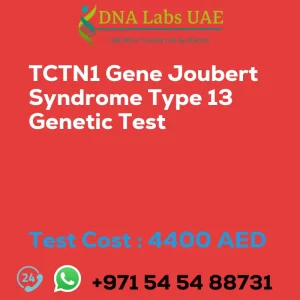SCN4A Gene Hyperkalemic periodic paralysis Genetic Test
Test Name: SCN4A Gene Hyperkalemic periodic paralysis Genetic Test
Components: Blood or Extracted DNA or One drop Blood on FTA Card
Price: 4400.0 AED
Sample Condition: Blood or Extracted DNA or One drop Blood on FTA Card
Report Delivery: 3 to 4 Weeks
Method: NGS Technology
Test Type: Neurological Disorders
Doctor: Neurologist
Test Department: Genetics
Pre Test Information: Clinical History of Patient who is going for SCN4A Gene Hyperkalemic periodic paralysis NGS Genetic DNA Test. A Genetic Counselling session to draw a pedigree chart of family members affected with SCN4A Gene Hyperkalemic periodic paralysis.
Test Details:
The SCN4A gene is responsible for producing a protein called the sodium channel alpha subunit 4, which is involved in the functioning of sodium channels in muscle cells. Mutations in the SCN4A gene can lead to a condition called hyperkalemic periodic paralysis (HYPP).
Hyperkalemic periodic paralysis is a rare genetic disorder characterized by episodes of muscle weakness or paralysis. These episodes are often triggered by factors such as stress, exercise, or high-potassium foods. During an episode, the affected individual may experience muscle stiffness, weakness, or even complete paralysis. These episodes can last from minutes to hours and typically resolve spontaneously.
NGS (Next-Generation Sequencing) genetic testing is a type of genetic testing that allows for the simultaneous analysis of multiple genes. In the case of hyperkalemic periodic paralysis, NGS can be used to sequence the SCN4A gene and identify any mutations or variations that may be present.
NGS genetic testing for hyperkalemic periodic paralysis can help confirm a diagnosis, especially in individuals with atypical or milder symptoms. It can also be used for genetic counseling and family planning purposes. Additionally, NGS testing may provide insights into the specific mutation present in an individual, which can help guide treatment decisions and management strategies.
It is important to note that NGS genetic testing should be performed and interpreted by qualified healthcare professionals, such as geneticists or genetic counselors, who can provide appropriate guidance and support based on the results.
| Test Name | SCN4A Gene Hyperkalemic periodic paralysis Genetic Test |
|---|---|
| Components | |
| Price | 4400.0 AED |
| Sample Condition | Blood or Extracted DNA or One drop Blood on FTA Card o |
| Report Delivery | 3 to 4 Weeks |
| Method | NGS Technology |
| Test type | Neurological Disorders |
| Doctor | Neurologist |
| Test Department: | Genetics |
| Pre Test Information | Clinical History of Patient who is going for SCN4A Gene Hyperkalemic periodic paralysis NGS Genetic DNA Test A Genetic Counselling session to draw a pedigree chart of family members affected with SCN4A Gene Hyperkalemic periodic paralysis |
| Test Details |
The SCN4A gene is responsible for producing a protein called the sodium channel alpha subunit 4, which is involved in the functioning of sodium channels in muscle cells. Mutations in the SCN4A gene can lead to a condition called hyperkalemic periodic paralysis (HYPP). Hyperkalemic periodic paralysis is a rare genetic disorder characterized by episodes of muscle weakness or paralysis. These episodes are often triggered by factors such as stress, exercise, or high-potassium foods. During an episode, the affected individual may experience muscle stiffness, weakness, or even complete paralysis. These episodes can last from minutes to hours and typically resolve spontaneously. NGS (Next-Generation Sequencing) genetic testing is a type of genetic testing that allows for the simultaneous analysis of multiple genes. In the case of hyperkalemic periodic paralysis, NGS can be used to sequence the SCN4A gene and identify any mutations or variations that may be present. NGS genetic testing for hyperkalemic periodic paralysis can help confirm a diagnosis, especially in individuals with atypical or milder symptoms. It can also be used for genetic counseling and family planning purposes. Additionally, NGS testing may provide insights into the specific mutation present in an individual, which can help guide treatment decisions and management strategies. It is important to note that NGS genetic testing should be performed and interpreted by qualified healthcare professionals, such as geneticists or genetic counselors, who can provide appropriate guidance and support based on the results. |







